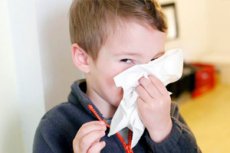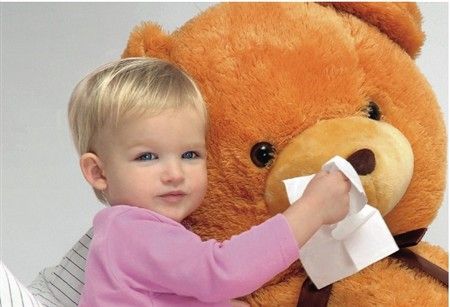Medical expert of the article
New publications
A baby's runny nose
Last reviewed: 05.07.2025

All iLive content is medically reviewed or fact checked to ensure as much factual accuracy as possible.
We have strict sourcing guidelines and only link to reputable media sites, academic research institutions and, whenever possible, medically peer reviewed studies. Note that the numbers in parentheses ([1], [2], etc.) are clickable links to these studies.
If you feel that any of our content is inaccurate, out-of-date, or otherwise questionable, please select it and press Ctrl + Enter.

To cure a child's runny nose, you need to choose the right medicine, taking into account the child's age and health. Depending on how severe the disease that caused the child's runny nose is, its treatment can take from a week to 10 days. What are the features of treating a child's runny nose?
Causes of a runny nose in a child
They can be viral and bacterial infections. For example, flu or cold. Runny nose can also be caused by tuberculosis, syphilis, gonorrhea, and is treated together with the main disease in hospitals or specialized centers.
It is very important to take into account the age-specific features of treating runny nose in children. Runny nose in newborns, children of primary and secondary school age is treated differently. Therefore, parents should know about the features of each age period.
First aid for a runny nose
Whenever a child starts to have a runny nose, before using chemicals, you need to use other, more natural methods.
To make it more comfortable for a child to sleep, you need to raise the head of his sofa or bed. Therefore, the pillow should be higher, so that the head is raised to a height of up to 45 degrees. The only condition: the child should be comfortable to lie down. Then the mucus from the nose will be much easier to leave and the child will not suffer from breathing difficulties.
If a newborn has a runny nose and the nose is clogged with mucus, it can be removed with a bulb syringe or a regular syringe (without a needle, of course). This is done especially if the child cannot get rid of the mucus in the nose on his own. The edge of the syringe or the tip of the bulb is inserted into the baby's nose, but very carefully so as not to injure the mucous membrane of the nose. The mucus should be sucked out gradually - first from one nostril, then from the other. The nose should be cleared of mucus as often as necessary.

How to avoid damaging the nasal mucosa?
To prevent the mucous membrane of the nose from drying out along with mucus, it is necessary to moisturize it with mucus. To do this, you need to rinse the child's nose with a saline solution. If you do not take care of the child's nose, the mucus can dry out and the nasal passages can be injured. In addition to the saline solution, you can also use a saline solution, which is instilled into each nostril in turn. At this time, the child should lie with his head thrown back.
When saline or physiological solution first penetrates into the child's nose, he may experience coughing, vomiting or sneezing. But if you do the instillation procedure several times, the sensitivity of the mucous membrane of the nasopharynx will decrease significantly, and there will be no more unpleasant sensations. Rinsing the child's nasal passages can be repeated every half hour or hour - as the nose becomes clogged. The main thing is not to let the phlegm in the nose dry out. By instilling the nose, you will thereby help to liquefy the mucus and release it from the nasal passages.
What can be used to treat a runny nose instead of saline or salt solution?
These can be oily liquids. For example, vitamin A in solution or vitamin E - they are sold in any pharmacy. Or oil-based drops Ekteritsid. These liquids do not allow phlegm to dry in the nose, and also moisturize the mucous membrane of the nasopharynx, make it possible to relieve irritation, and regenerate tissues.
How to make nasal breathing easier for a child?
Medicines called decongestants help a child breathe easier. When they are instilled into the nose, they allow the child to breathe normally and are good for treating rhinitis (acute runny nose). These medicines are used for children of different ages - newborns, infants or older school-age children.
These medications do not always help and sometimes cause unwanted reactions in children. This happens when the medication is not used as directed, too often, or in larger doses than necessary.
True, if the child is not treated with these drugs, he may develop sinusitis - nasal congestion with accumulation of pus, as well as severe headaches and high temperature. Therefore, it is necessary not only to treat the child's runny nose, but also to remove tumors of the mucous membrane of the nasal passages, and also to remove harmful microbes from there with the help of bactericidal agents.
What are the medications for treating runny nose in children?
These can be local or topical and systemic medications from the group of decongestants. They are used mainly to reduce swelling of the nasal mucosa and constrict blood vessels. Because of this, breathing through the nose becomes freer, it is easier for the child to fight other cold symptoms, such as cough and high temperature.
Thanks to these two groups of drugs, the risk of developing sinusitis is reduced, since the maxillary sinuses are cleared.
Specifics of medicines for runny nose in children
Parents need to understand that the same medicine can be produced under different names if the manufacturers are different companies. But on the instructions for the medicine for a runny nose, you will be able to see the substance that is included in the composition of your medicine. This is what you need to pay attention to when buying. And if you do not understand these subtleties. Then you need to ask your doctor what alternative names for the drops prescribed by him may be on the label.
One of the most reliable remedies for runny nose in children is Derinat. It is characterized as a remedy with excellent tolerability and a good effect of reducing cold symptoms.
This drug activates the child's immunity and gives him the ability to cope with colds and their symptoms more quickly.
What are the risks to a child if they take cold medicine incorrectly?
If parents used drugs for their child without permission, without a doctor's prescription, exceeded the dose, gave the drug too often, the child may have complications. Side effects or complications from taking drugs for a runny nose may include: anxiety, increased excitability of the nervous system, allergic rhinitis, atrophy of the nasal mucosa, inhibition of the brain, even falling into a coma.
If a child's runny nose, despite all the treatment measures taken, does not go away, but only gets worse, you should definitely consult a pediatrician. He will tell you. Are there any complications of a cold or another disease in the child. This could be sinusitis, otitis, pharyngitis, which need to be treated with antibiotics. These antibiotics should be prescribed again by a doctor, and not bought for the child without permission.
A child's runny nose can go away quickly and easily, or it can drag on and not go away. It all depends on how promptly you contacted the doctor and how correctly you followed the course of treatment prescribed by him.


 [
[